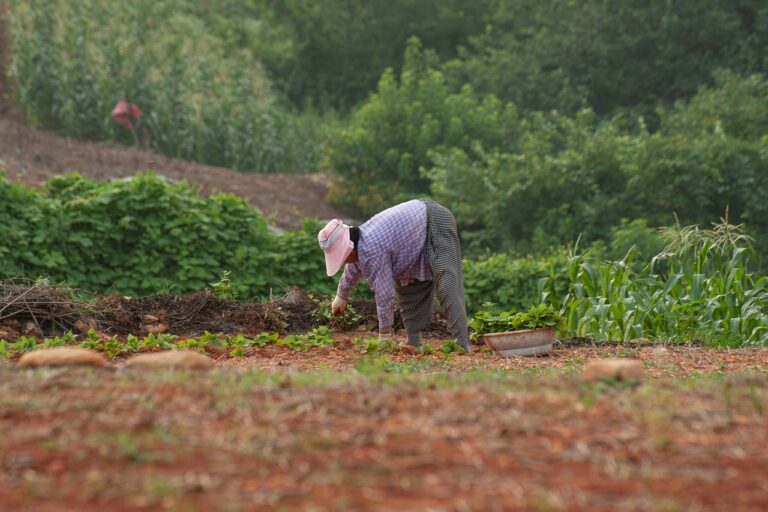The Importance of Farmer Training in Sustainable Practices: 11xplay reddy login registration, Gold365 login, Skyfairs new id
11xplay reddy login registration, gold365 login, Skyfairs New ID: As farmers around the world face increasing challenges due to climate change, soil degradation, water scarcity, and other environmental issues, the importance of training in sustainable practices has become more critical than ever. Sustainable agriculture aims to meet the needs of the present without compromising the ability of future generations to meet their own needs. It involves practices that are environmentally friendly, socially responsible, and economically viable. Farmer training plays a crucial role in helping farmers adopt sustainable practices and improve their livelihoods. Here, we explore the significance of farmer training in sustainable agriculture.
The Need for Farmer Training
Many farmers around the world continue to rely on conventional farming methods that deplete soil nutrients, pollute water sources, and harm the environment. Without proper training, these farmers may not be aware of the negative impact of their practices or the benefits of transitioning to sustainable agriculture. Farmer training helps to raise awareness about the importance of sustainable practices and provides farmers with the knowledge and skills needed to implement them effectively.
Benefits of Sustainable Agriculture
Sustainable agriculture offers numerous benefits for farmers, the environment, and society as a whole. By adopting sustainable practices, farmers can improve soil health, conserve water resources, reduce greenhouse gas emissions, and protect biodiversity. Sustainable agriculture also promotes the use of organic inputs, minimizes chemical inputs, and enhances crop resilience to climate change. Additionally, sustainable agriculture can increase farmers’ income and food security while improving the quality of products for consumers.
Role of Farmer Training
Farmer training plays a vital role in promoting sustainable agriculture by providing farmers with the necessary information, tools, and resources to implement sustainable practices. Training programs cover a wide range of topics, including soil conservation, water management, integrated pest management, agroforestry, and organic farming. By participating in training programs, farmers can learn how to improve soil fertility, crop productivity, and pest control while reducing their environmental footprint.
Moreover, farmer training helps farmers develop new skills, adopt innovative technologies, and access market opportunities. Training programs often include hands-on demonstrations, field visits, workshops, and peer learning activities to support knowledge sharing and capacity building among farmers. By empowering farmers with the knowledge and skills they need, training programs can lead to lasting improvements in agricultural productivity, efficiency, and sustainability.
Challenges in Farmer Training
While farmer training is essential for promoting sustainable agriculture, several challenges exist in ensuring its effectiveness and scalability. Access to training programs, especially in remote or marginalized communities, can be limited due to lack of infrastructure, resources, and support. Language barriers, cultural differences, and low literacy levels may also hinder farmers’ participation in training programs.
Additionally, the quality and relevance of training content, delivery methods, and follow-up support can vary significantly across different programs. Some training programs may focus on theoretical concepts rather than practical skills, while others may lack up-to-date information on sustainable practices. Furthermore, the sustainability of training programs can be challenging to maintain over the long term, especially without proper funding, monitoring, and evaluation mechanisms in place.
The Importance of Monitoring and Evaluation
To ensure the effectiveness and impact of farmer training programs, it is essential to implement robust monitoring and evaluation systems. Monitoring helps track the progress and outcomes of training programs, while evaluation assesses the relevance, efficiency, and sustainability of interventions. By collecting data on key performance indicators, such as knowledge acquisition, skills development, behavior change, and adoption of sustainable practices, organizations can measure the success of training programs and identify areas for improvement.
Monitoring and evaluation also help to demonstrate the value of farmer training in sustainable agriculture to donors, policymakers, and other stakeholders. By showcasing the positive impact of training programs on farmers’ livelihoods, environmental sustainability, and food security, organizations can secure continued support, funding, and resources for scaling up successful interventions. Moreover, monitoring and evaluation enable organizations to learn from their experiences, share best practices, and replicate successful models in other contexts.
Recommendations for Improving Farmer Training
To enhance the effectiveness of farmer training in sustainable agriculture, organizations can take several steps to improve the design, delivery, and impact of training programs. First, organizations should conduct needs assessments to identify the specific challenges, priorities, and opportunities facing farmers in different regions. By tailoring training content to local contexts, languages, and cultures, organizations can ensure the relevance and accessibility of programs for target audiences.
Second, organizations should adopt participatory and interactive training methods that engage farmers actively in the learning process. Hands-on demonstrations, field visits, peer learning, and farmer-to-farmer exchanges can enhance knowledge sharing, skills development, and behavior change among participants. By promoting experiential learning and practical application of sustainable practices, organizations can empower farmers to drive positive change in their communities.
Third, organizations should prioritize capacity building and extension services to provide ongoing support and guidance to farmers beyond training programs. Follow-up visits, demonstration plots, helplines, and online resources can help farmers apply new techniques, troubleshoot challenges, and access additional information when needed. By establishing long-term relationships with farmers, organizations can ensure the sustainability and scalability of training initiatives over time.
FAQs
1. What are sustainable agriculture practices?
Sustainable agriculture practices include soil conservation, water management, crop rotation, agroforestry, integrated pest management, organic farming, and biodiversity conservation. These practices aim to promote environmental sustainability, social responsibility, and economic viability in agriculture.
2. How can farmer training help promote sustainable agriculture?
Farmer training helps raise awareness about sustainable practices, provide farmers with the knowledge and skills needed to implement them effectively, and support capacity building, innovation, and market opportunities. By empowering farmers with the tools and resources they need, training programs can drive positive change in the agricultural sector.
3. What are the benefits of sustainable agriculture for farmers?
Sustainable agriculture offers numerous benefits for farmers, including improved soil health, water conservation, reduced input costs, increased crop resilience, enhanced market access, and higher income opportunities. By adopting sustainable practices, farmers can improve their livelihoods while protecting the environment and contributing to food security.
In conclusion, the importance of farmer training in sustainable practices cannot be overstated. By equipping farmers with the knowledge, skills, and resources they need to transition to sustainable agriculture, training programs can drive positive change in the agricultural sector, improve farmers’ livelihoods, and protect the environment for future generations. As we confront the challenges of climate change, soil degradation, and food insecurity, investing in farmer training is essential for building a more sustainable and resilient agricultural system.







